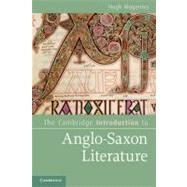
Note: Supplemental materials are not guaranteed with Rental or Used book purchases.
Purchase Benefits
What is included with this book?
| List of illustrations | p. viii |
| Preface | p. ix |
| Acknowledgements | p. xi |
| List of abbreviations | p. xii |
| Approaching Anglo-Saxon literature | p. 1 |
| Beginnings: Bede's story of Caedmon | p. 1 |
| Studying Anglo-Saxon literature: perspectives and perceptions | p. 9 |
| Anglo-Saxon literary history: an outline | p. 16 |
| Migration and after | p. 17 |
| The early centuries of Christian Anglo-Saxon England | p. 19 |
| Vikings, and the emergence of Wessex | p. 23 |
| Later Anglo-Saxon England: the later tenth and eleventh centuries | p. 26 |
| Cædmon's Hymn: reading an Old English poem | p. 30 |
| Postscript: what's in a name?: Anglo-Saxons, Anglo-Saxon and Old English | p. 33 |
| Developing literary traditions | p. 36 |
| Old English poetry and its oral Germanic background | p. 36 |
| Writings in Latin | p. 45 |
| Bede | p. 47 |
| Alcuin | p. 49 |
| Aldhelm | p. 50 |
| Other writers | p. 52 |
| Writings in Old English prose | p. 53 |
| The ninth century and writings associated with King Alfred | p. 56 |
| Ælfric and later prose writings | p. 62 |
| Traditions of Christian poetry | p. 66 |
| Postscript: Riddle 47: words oral and written | p. 73 |
| Varieties of narrative | p. 76 |
| Heroic poetry | p. 77 |
| Action and the hero | p. 79 |
| Beowulf | p. 82 |
| Biblical literature: translations and adaptations in Old English | p. 84 |
| Judith: a biblical adaptation in Old English verse | p. 93 |
| The past and its meaning: writing history | p. 96 |
| Bede's Ecclesiastical History of the English People | p. 103 |
| The Anglo-Saxon Chronicle | p. 110 |
| Christian heroes: writing about the saints | p. 116 |
| A virgin martyr: Juliana | p. 123 |
| An English saint: Ælfric's Passion of St Edmund | p. 127 |
| Postscript: gained in translation | p. 130 |
| Belief, knowledge, experience: some non-narrative strands | p. 133 |
| Old English homilies | p. 133 |
| Explaining scripture: Ælfric on the Innocents | p. 137 |
| Moral exhortation: Wulfstan's Sermon of the Wolf to the English | p. 140 |
| Wisdom and lore | p. 143 |
| The riddles of the Exeter Book | p. 149 |
| Old English elegies | p. 153 |
| Two secular elegies: Wulf and Eadwacer and The Wife's Lament | p. 156 |
| Religious elegy: The Seafarer | p. 158 |
| Postscript: genre and manuscripts | p. 162 |
| Anglo-Saxon afterlives, medieval to modern: later uses and appropriations of Anglo-Saxon writings | p. 165 |
| Medieval continuities | p. 166 |
| Early modern: recovering Anglo-Saxon England | p. 168 |
| The long eighteenth century: history and politics | p. 172 |
| Nineteenth - and twentieth-century perspectives | p. 175 |
| Creative writers and Anglo-Saxon literature: from Wordsworth and Longfellow to Heaney and the present | p. 179 |
| Postscript: Riddle 60 and The Husband's Message translated | p. 187 |
| Appendix: resources for studying Anglo-Saxon literature | p. 190 |
| Bibliography | p. 195 |
| Index | p. 212 |
| Table of Contents provided by Ingram. All Rights Reserved. |
The New copy of this book will include any supplemental materials advertised. Please check the title of the book to determine if it should include any access cards, study guides, lab manuals, CDs, etc.
The Used, Rental and eBook copies of this book are not guaranteed to include any supplemental materials. Typically, only the book itself is included. This is true even if the title states it includes any access cards, study guides, lab manuals, CDs, etc.